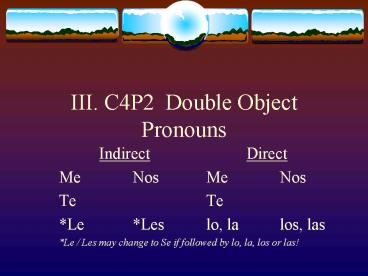III' C4P2 Double Object Pronouns - PowerPoint PPT Presentation
1 / 7
Title:
III' C4P2 Double Object Pronouns
Description:
Indirect Object - 2 whom/4 whom, 2 what/4what something is done. Direct Object - who/what receives the action of the verb. Ej: I send the letter to Mike. ... – PowerPoint PPT presentation
Number of Views:56
Avg rating:3.0/5.0
Title: III' C4P2 Double Object Pronouns
1
III. C4P2 Double Object Pronouns
- Indirect Direct
- Me Nos Me Nos
- Te Te
- Le Les lo, la los, las
- Le / Les may change to Se if followed by lo, la,
los or las!
2
Definiciones
- Indirect Object - 2 whom/4 whom, 2 what/4what
something is done. - Direct Object - who/what receives the action of
the verb. - Ej I send the letter to Mike.
- Indirect is to Mike (in Spanish) Direct is the
letter!
3
Pronoun Placement
- When an Indirect and Direct Object Pronoun are
used together, the Indirect always comes first! - Ej Te lo doy mañana.
- Verb and Object Pronouns form an unbreakable
unit. - Ej El joven me lo compró ayer.
4
More Pronoun Placement
- With Infinitives and -ING, you may attach them to
the end (accenting when necessary) - Or
- You may put them before the verb in a form.
- Ej Me vas a comprar una gaseosa al baile, no?
- Vas a comprarme una gaseosa al baile, no?
- Martina me está hablando ahora.
- Martina está hablándome ahora.
5
Pronoun Placement with Commands
- Affirmatives Attach
- Cómpramelo!
- Negatives After the NO before the command.
- No me lo compres!
6
A escribir!
- Bring us some bread!
- Dont bring us anything!
- We are telling you the truth.
- Tell him it (el secreto). tricky
- The waiter brings / is bringing her it (the
bill). - Try to write them as many ways as you can!!!
7
Respuestas
- Tráiganos pan! formal Tráenos pan!
informal - No nos traiga(s) nada!
- Te estamos diciendo la verdad. Estamos
diciéndote la verdad. - Te decimos la verdad.
- Díselo! se replaces le when followed by lo, la,
los or las. - El mesero se la trae/ se la está trayendo or está
trayéndosela.































